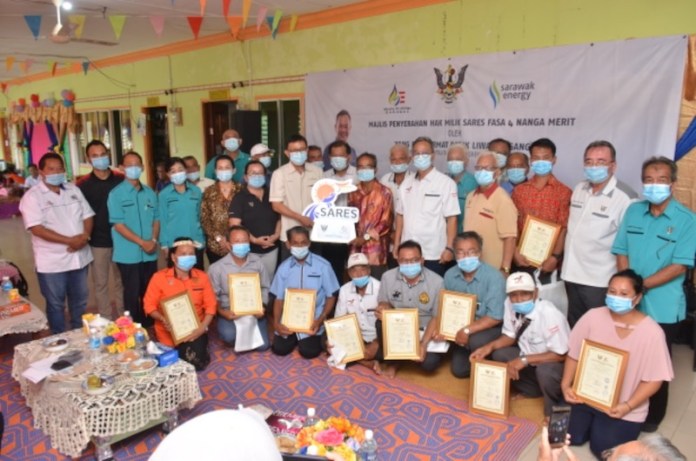
KAPIT, Sept 29: Thirteen longhouses in the Nanga Merit subdistrict of Kapit, comprising 290 households with 2,200 residents now have access to reliable and renewable 24-hour solar-generated electricity.
A press release revealed this was made possible through the Sarawak Alternative Rural Electrification Scheme (Sares) initiative funded by the Sarawak government via the Ministry of Utilities and implemented by Sarawak Energy Berhad.
For Kapit Division, which includes Kapit, Song, Belaga and Bukit Mambong, more than 3,100 households from 142 remote villages, with a total of 24,900 residents now have access to 24-hour free renewable energy supply via Sares. The sub-district of Nanga Merit has a total of 49 villages comprising 1,009 households of almost 8,000 residents.
Nanga Merit is a tributary of the Rejang River and is only accessible by river and timber track road. With longhouses along its banks too distant to be connected to grid electricity, the fastest way to electrify households has been through Sares.
An event was held at Rumah Entili, located two hours by boat from Kapit town yesterday for the official handover of the newly installed Sares systems from project implementor Sarawak Energy to the 13 beneficiary villages. The event also celebrated the successful completion of their training to perform simple operations and maintenance of the solar systems.
The beneficiary villages comprise Rumah Seking, Rumah Entili, Rumah Anthony Jiram, Rumah Yan Ngumbang, Rumah Wilfred Guyang, Rumah Lawrence Lannie, Rumah Milang, Rumah Berundang, Pekan Nanga Merit, Rumah Ibin, Rumah Rajau, Rumah Sadang and Rumah Julau.
Assistant Minister for Utilities (Rural Electricity), Datuk Liwan Lagang officiated at the event representing Minister of Utilities, Datuk Seri Dr Stephen Rundi Utom. He was joined by Hulu Rajang MP Datuk Wilson Ugak Kumbong, Temenggong Ajang Sirek and representatives from the Ministry of Utilities, relevant agencies and community leaders.
Sarawak Energy was represented by Dr Chen Shiun, vice-president for rural electrification and the Sares team.
“These 13 villages are very remote without proper road access and it would have taken several more years before we can supply grid-connected electricity. However, through Sares, we have been able to make sure reliable and renewable electricity reach them much earlier. ‘Syabas’ (well done) to all parties involved,” said Liwan.

Liwan congratulated the residents of the 13 longhouses and advised them to take good care of their newly installed Sares solar systems and reassured them that Sarawak Energy would continue to provide technical support after the project’s completion and implementation.
“The Sares system gives our rural folk the same access to electricity that town people have. Although they don’t have to pay electricity bills, they have the responsibility of operating and maintaining the systems themselves.
“The system displaces noisy diesel generators and provides convenience and ease to the lives of the people here and in many other remote communities of Sarawak. We hope that you will take care of these systems so that they can last many years into the future,” said Liwan.
The Sarawak government and the Ministry of Utilities through Sarawak Energy aims to light up about 22,360 rural households in the coming years with reliable 24-hour electricity supply by extending the transmission and distribution infrastructure into more rural areas or providing standalone system solutions such as Sares.
Over RM2.37 billion has been allocated by the state government for electrification projects over these next two years towards achieving this.
The Sares system provides 3,000Wh of renewable electricity per day, sufficient to power a typical rural household’s basic needs such as lighting, fans, television, small refrigerator and rice cooker which allows the communities to reduce the need to travel to town frequently to buy provisions and diesel for generator sets. — DayakDaily







